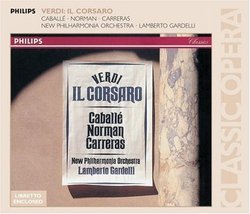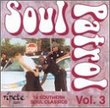| All Artists: Giuseppe Verdi, Lamberto Gardelli, New Philharmonia Orchestra, Alexander Oliver, Clifford Grant, Gianpiero Mastromei, Jessye Norman, John Noble, José Carreras, Montserrat Caballé Title: Il Corsaro Members Wishing: 0 Total Copies: 0 Label: Philips Original Release Date: 1/1/2005 Re-Release Date: 8/9/2005 Genre: Classical Style: Opera & Classical Vocal Number of Discs: 2 SwapaCD Credits: 2 UPC: 028947567691 |
Search - Giuseppe Verdi, Lamberto Gardelli, New Philharmonia Orchestra :: Il Corsaro
 | Giuseppe Verdi, Lamberto Gardelli, New Philharmonia Orchestra Il Corsaro Genre: Classical
|
Larger Image |
CD DetailsSimilar CDs
|
CD ReviewsI've run out of superlatives........ PhantomOfTheOpera | Norway | 08/12/2005 (5 out of 5 stars) "This opera has been unfamiliar to me until last week when I stumbled upon it in Athens airport. I have to admit that I bought it expecting very little. The only reason I bought it in the first place is because it features José Carreras as Corrado...... But I was completely blown away by the music which is absolutely beautiful. I haven't been able to find a single weak spot. Il corsaro was recorded in 1976, which finds all the singers in resplendent voice. José Carreras's singing is downright heavenly and spine-tingling! His voice is warm and sensual and not to mention powerful and demanding when necessary. It's hard to come up with new ways of describing his voice and his singing. So let's just say that people who know how José sounded in the 1970's won't be disappointed and those unfamiliar to it have a major surprise in wait.....To me he is the only opera singer that can evoke emotions the way he does. It can't be explained, you just have to listen for yourself. He is actually the reason why I started listening to opera in the first place. And I can only say that he made me discover feelings that I thought was dead and buried a long time ago. Jessye Norman sings the part of Medora, the girl who poisons herself when she thinks that Corrado has died on one of his "missions". He hasn't though and he returns home just in time for her to die in his arms. He brings with him the slave/harem-girl Gulnara - sung by Montserrat Caballé, who rescued him from certain death by her master "Seid". She killed her master to save Corrado and Corrado feels obliged to take her with him when he returns back home. I haven't been too keen on Montserrat Caballé earlier, but my opinion changed after listening to this recording. Her singing is superb and she really adds drama to the part. At this point in her career her voice didn't have too much of the "steely sound" that ruins a lot of her later recordings because it makes her sound just harsh and cold. The early Jessye Norman is a treat listening to, her voice liquid and floating. All her arias are beautifully sung, especially the final aria with Carreras and Caballé where Medora is dying. It's heartwrenching. This album is money well spent. I promise you won't regret buying it." SWAGGER AND SWASHBUCKLE DAVID BRYSON | Glossop Derbyshire England | 08/09/2005 (5 out of 5 stars) "Verdi's interactions with his librettists, publishers, impresarios and censors would have made a good opera in their own right, I often think. The difficult early history of Il Corsaro is related in fascinating detail and with the right sense of humour for us in a really excellent essay by Julian Budden that accompanies this well-produced set. Whatever interruptions and rethinking its genesis underwent, I would call it a superb piece of early Verdi, full of the raw power, drama and melody that had Shaw, in defiance of orthodoxy at the time, calling him a far greater composer than Mendelssohn. I can also only compliment Philips for reissuing it now (it was originally made 30 years ago) and treating with a proper disdain any misplaced sensitivity that might be felt about its subject-matter. The story concerns a reach-me-down operatic situation in which corsairs battle with a conventionally villainous Pasha to gain the release of a female slave, and the political content or relevance to current events of this narrative with its eunuchs, Turks, dervishes, odalisques and general atmosphere of bead-curtains and Ali Baba seems to me to be precisely nil. Gardelli handles the score as to the manner born, never letting the pace relax or playing down the hyperbole and melodrama. The cast perform admirably, including the minor players. Carreras in particular is on superb form, and while I wondered whether the part of Medora might be just a little low-key for Jessye Norman she is at her formidable best in the final trio with Carreras and Montserrat Caballe. The part of the slave Gulnara, sung by Caballe, is the most dramatic, and her long duets first with the menacing Pasha Seid and then with the dithering Corrado (Carreras) are absolutely gripping. It struck me as being lucky that Seid had already left the room before she let out her final 'Guai, tiranno', otherwise it might have blown him through the door. I am far too keen on Verdi to be as discriminating as Julian Budden is in his very thoughtful comments on the arias - I swallow them whole. He has some interesting remarks about the instrumental writing too, in which there are the touches of originality and genius that would flower fully much later in the Requiem. In general the orchestration is the big guitar, which I take and enjoy as I find it. You could tell that the recording is not quite recent, but it is perfectly satisfactory for the most part, although Norman is probably treated too much at arm's length. For me this set is a major musical and theatrical event. I have not throughout my life noticed many performances of Il Corsaro advertised. If I see any more now I shall know what I ought not to go on missing." Worth every minute spent listening to it. OperaOnline.us | Boston, MA | 07/23/2007 (5 out of 5 stars) "This 2CD offering from Philips, featuring the talents of José Carrreras, Jessye Norman and Montserrat Caballé is a robust and melodic selection from the Classics Library, worth every minute of its beautiful scoring and brilliant performances. Released originally in 1976, this 2005 CD package is what opera is all about, written at a time when big and romantic, and maybe even a little impossible, was matched by a composer whose scoring equaled the grandness of the story being told and the giants of singers who took on the parts. The story here is not complicated, Corrado, a pirate leader, sung here by José Carreras, sets off on a journey to war against Moslems and their leader the Pasha Seid, sung by Gian-Pietro Mastromei. Corrado leaves behind his beloved, Medora, sung by Norman, and meets the slave Gulnara, sing by Cabellé, who is, unfortunately, the favorite of the Pasha. Gulnara falls in love with Corrado and after freeing Corrado makes her escape with him from the Pasha's fortress dungeon. Just as Corrado arrives back home, Medora, sips poison believing him dead. As she dies Corrado tells of his grand adventure, then after her death, he flings himself from a cliff to his own death, leaving Gulnara in mourning. Phew! If you haven't heard the score, prepare to be entertained and pleased with its wonderful melodic value and rousing tunes, beautiful quartets, duets and orchestral accompaniment throughout. This review appeared at OperaOnline.us."
|

 Track Listings (17) - Disc #1
Track Listings (17) - Disc #1
